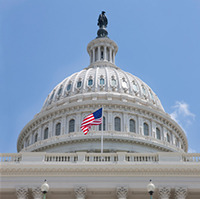“District Dialogs”: Corker Ponders Progress on Dodd-Frank, Mortgage Market Reform
Beginning this August, CFA Institute is working with its local member societies in the United States to host a series of town-hall meetings with members of U.S. Congress. In particular, these efforts are targeted toward putting our members together with members of the House Financial Services Committee and Senate Banking Committee.
These meetings, which we’ve dubbed “District Dialogs,” are intended to accomplish two things. First, they seek to introduce representatives and senators to the wisdom and experience of our members who are constituents and, thus, potential voters. Secondly, by virtue of this introduction, these meetings are intended to enhance the effect of the policy perspectives and research conveyed by CFA Institute to the congressional members’ staffs in Washington D.C.
To date, we have organized four such meetings. The first (discussed below) was hosted by the CFA Society of Nashville with Sen. Bob Corker (R-Tenn), a member of the Senate Banking Committee. Other meetings include: 21 August with the CFA Society of Los Angeles hosting Rep. Maxine Waters (D-Calif), ranking minority member on the House Financial Services Committee; 28 or 29 August with the CFA Society of Tampa hosting Rep. Dennis Ross (R-Fla); and 5 September with the CFA Society of Colorado hosting Rep. Ed Perlmutter (D-Colo).
The following is a report on the inaugural District Dialog hosted by the CFA Society of Nashville, which attracted about 75 CFA Institute members.
Contrary to news report of gridlock in Washington D.C., Sen. Corker expressed rare optimism about the potential for action on a number of issues important to financial markets. But while he saw possible steps on big-picture items like systemic risk and reform of entitlements and mortgage markets, the senator was less optimistic about much-needed changes and improvements to Dodd-Frank.

Sen. Bob Corker (R-Tenn), left, participates in the inaugural “District Dialog” hosted by the CFA Society of Nashville.
Bipartisan Plan to Wind down Fannie Mae and Freddie Mac
On the issue of mortgage market reform, the senator noted the potential for a bill he introduced jointly with Sen. Mark Warner (D-Va). The bill would create a new Federal Mortgage Insurance Corp. while winding down the two mortgage government-sponsored enterprises, Fannie Mae and Freddie Mac, over the next five years.
Corker also noted optimism about reaching a deal to reduce the federal government’s fiscal deficits that might include reforms to make entitlements like Social Security and Medicare fiscally solvent for the long term. The cooperation is a result, the senator said, of a year’s worth of work among a group of senators who have acted as a sounding board for the Obama administration on economic policy issues.
Dodd-Frank Technical Corrections
Where cooperation is lacking, however, is in financial market regulation, and in particular fixing the problems within Dodd-Frank. The problem in many ways is the omnibus nature of modern legislative bills, which need support resulting from amendments that deal with special concerns or pet projects of individual members of Congress. Unfortunately, such large bills limit the flexibility to fix even technical problems because efforts to amend such sweeping laws could subject members to demagogy from the other party, and laws to wholesale changes.
Indeed, this seems to be the problem with Dodd-Frank. Many Republicans in the House and Senate would like to repeal or significantly alter Dodd-Frank while the Obama administration and Democrats in the Senate have been opposed even to fixing misspelled words and other technical corrections for fear that once begun, the changes could morph into a wholesale rewriting of the law. Consequently, the logjam created by many of the problems in the bill is unlikely to see repairs any time soon.
Nevertheless, Sen. Corker indicated that policymakers in Washington D.C. are starting to realize that Dodd-Frank did not end the moral hazard associated with too-big-to-fail banks, something the markets have understood since Congress put the finishing touches on the reform act in June 2010. Nevertheless, that the Senate is starting to recognize the deficiency, Corker said, is a hopeful signal that a more thorough, deliberative approach to dealing with systemic issues might be forthcoming in the next Congress or two.
So congratulations to the Nashville society for taking the lead on the District Dialog effort, and for putting on an excellent event. And it’s on to Los Angeles for the next in the series.
Photo credit: iStockphoto/MiguelMalo

